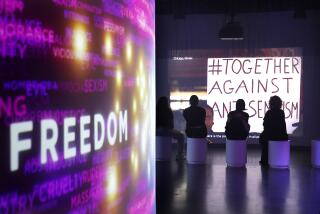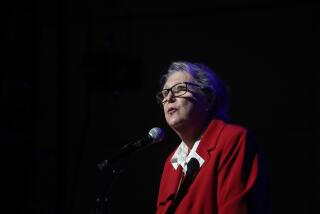L.A. Area Muslims Disagree With Khomeini’s Call to Kill Rushdie
- Share via
Several representatives of Los Angeles area Muslims, estimated to number 250,000, said Tuesday that they “disagreed” with the call by Iran’s Ayatollah Ruhollah Khomeini for the killing of author Salman Rushdie, declaring in a statement that “neither bitterness nor violence” will end rising tensions between Muslims and non-Muslims.
But one spokesman at a news conference declined to use stronger words against Khomeini such as denounce or condemn-- words suggested by two television reporters.
“You are trying to put words in my mouth,” said Dr. Hassan Hathout of the Islamic Center of Southern California. Hathout and other representatives accused some reporters, editorial writers and talk show hosts of perpetuating religious hatred through sensationalist language and ignorance of Islam.
The Los Angeles-based Islamic Center, which held the news conference, received several threatening phone calls in recent days, including three on Tuesday, according to Salam Al-Marayati, public relations director for the Muslim Political Action Committee.
In addition, vandals slashed tires on four cars parked Monday night at the Arcadia home of Dr. Maher Hathout, brother of Hassan Hathout and the most prominent leader of the Islamic Center. Maher Hathout, like his brother a physician, addressed Pope John Paul II along with local Jewish, Hindu and Buddhist leaders during the papal visit to Los Angeles in 1987.
Al-Marayati said he considered the vandalism a hate-motivated act against a Muslim leader, but Hathout, who did not attend the press conference Tuesday, said he did “not want to make a big thing of it. I don’t know who did it or why.”
Hathout added, however, that his home is “known as the home of a Muslim” because neighbors had objected to a 6-foot wrought-iron fence erected around his home “on the advice of security agents,” and the neighborhood dispute was written up in a community paper.
Islamic leaders in Southern California, in attempting to find a common response to Khomeini’s threats against Rushdie, author of “The Satanic Verses,” have been irked by the news media’s greater focus on the Iranian leader than on the book’s offense to Muslims.
Nazir Khaja, president of the Islamic Information Service of Los Angeles, said that some members of the media appear to think--wrongly--that Khomeini speaks for all Muslims. “Anyone calling for retaliation . . . is really not acceptable to us,” Khaja said, although he declined to speak against the Iranian leader in stronger terms.
Al-Marayati said after the news conference that he believes the death threat “should be condemned” and the book should be condemned “but not banned.” He said he believes this view is the prevailing sentiment at the Islamic Center, which embraces both Sunni Muslims and Muslims belonging to the Shiite branch that includes Khomeini.
If Rushdie were an Iranian subject and arrested in that country, a trial for blasphemy could be held, several Islamic leaders said Tuesday.
Muzammil Siddiqi, director of the Islamic Society of Orange County, said in a telephone interview that there is in Islamic law “a strong although not unanimous view that blasphemy is punishable by death.” Asked whether he personally thinks capital punishment would be appropriate in Rushdie’s case, Siddiqi was non-committal, saying that would have to be determined in the due process of Islamic law.
More to Read
Sign up for Essential California
The most important California stories and recommendations in your inbox every morning.
You may occasionally receive promotional content from the Los Angeles Times.













